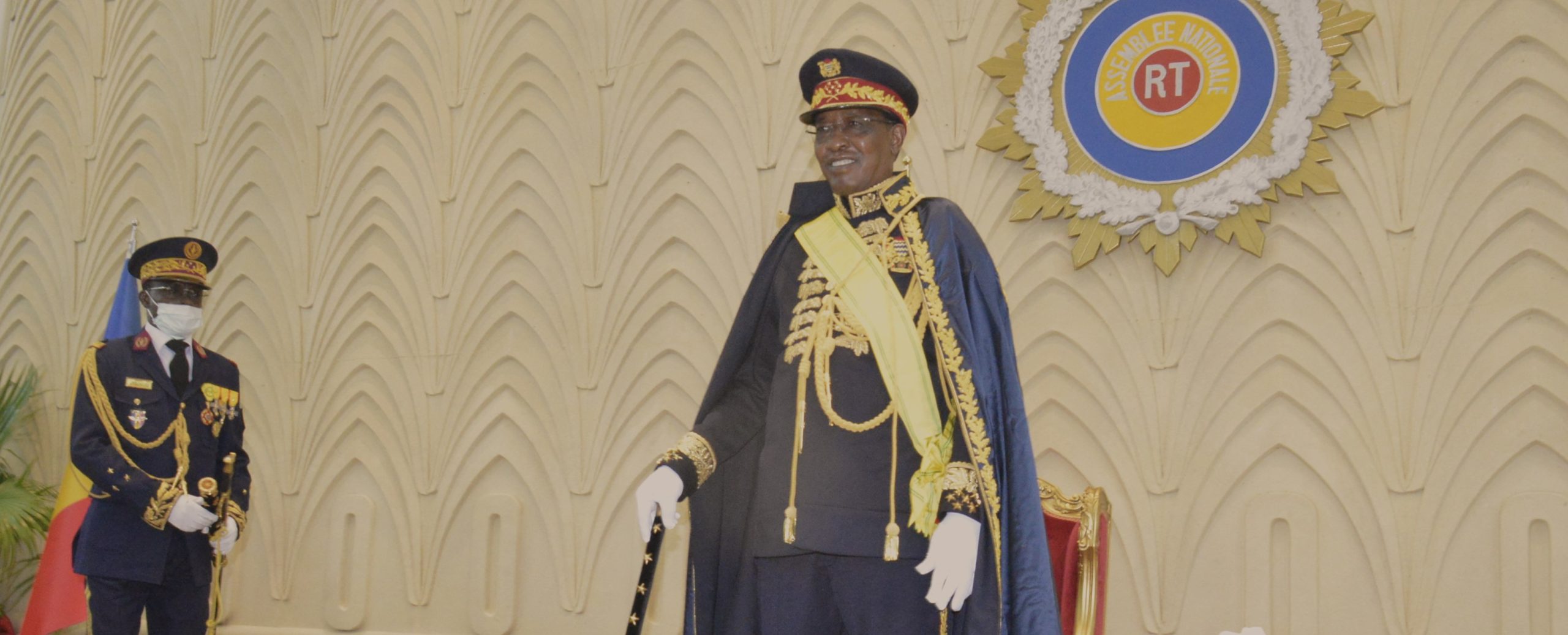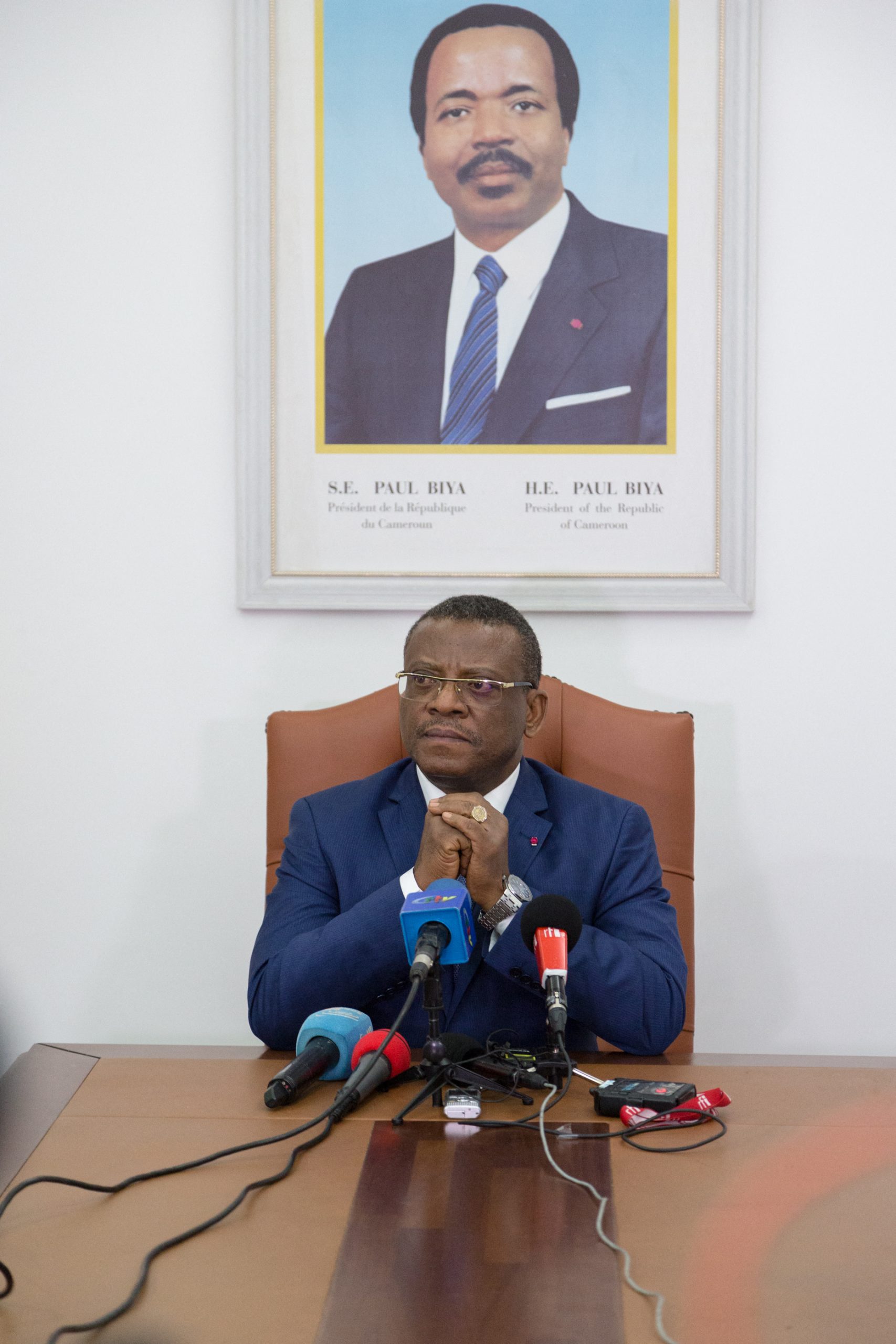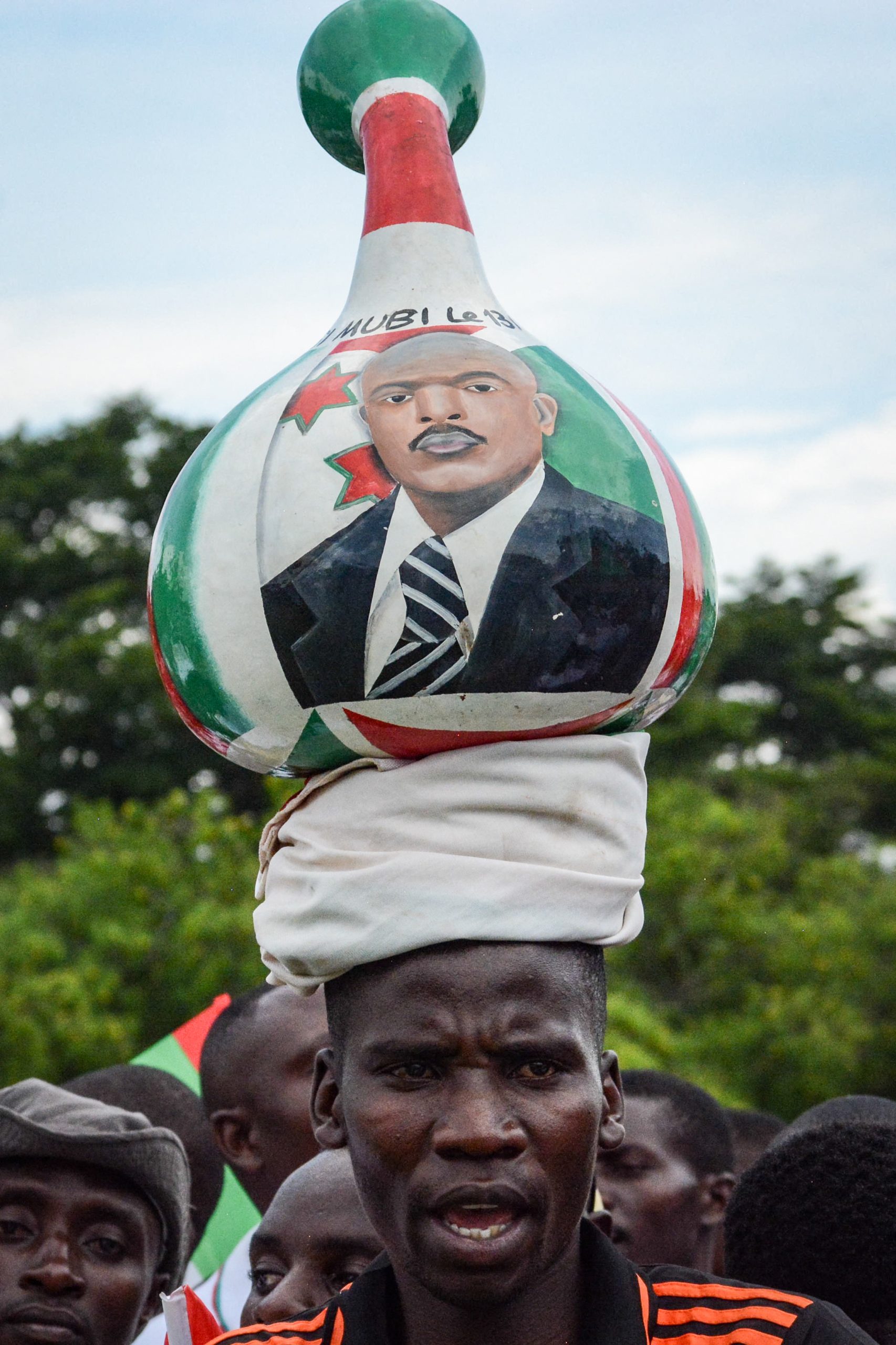
The late Chadian President Idriss Déby was awarded the title of Marshal of Chad during a ceremony on the 60th anniversary of Chad’s independence. (Photo: Renaud Masbeye Boybeye / AFP)
When long-serving, neo-patrimonial leaders in Burkina Faso, Gambia, Zimbabwe, and Sudan were forced to step down because of popular and youthful protests in recent years, the era of “presidents for life” in Africa seemed to be ending. Yet, for every such leader who has been forced from power, new ones emerge on the scene. In many cases, African leaders who retain power indefinitely are characterized by pervasive cults of personality, demonstrating the enduring potency of this instrument of power.
Cults of personality create an idealized and heroic image of a leader as being above and, in some cases, synonymous with the law, state, and country. Hence, the fate of the nation is tied to that of the leader who is promoted as its father or even grandfather. The nation’s wellbeing and safety depend on respect for the wisdom, patronage, and vigilance of the revered leader.
The longer a leader clings to power the more likely a cult of personality will develop. This is consistent with the observation that African leaders who evade term limits often have declining levels of popularity and legitimacy and, therefore, must increasingly rely on nondemocratic tools for maintaining authority. Such leaders do not govern by consent but through coercion, inhibiting political competition, and controlling rewards and punishments. This deviation from the rule of law often leads to human rights violations, the undermining of investor confidence, and the increased likelihood of conflict.
“African leaders who evade term limits often have declining levels of popularity and legitimacy and, therefore, must increasingly rely on nondemocratic tools for maintaining authority”
Many of Africa’s longest serving leaders—Equatorial Guinea’s Teodoro Obiang Nguema Mbasogo, who has ruled for 44 years, Cameroon’s Paul Biya (41 years), Uganda’s Yoweri Museveni (37 years), Eritrea’s Isaias Afewerki (30 years), and the Republic of the Congo’s Denis Sassou Nguesso (26 years)—have fostered cults of personality of one form or another.

Longtime Zimbabwean President Robert Mugabe and wife Grace Mugabe at a 2018 campaign rally. (Photo: Africa Metro)
Even when such leaders are ousted, their systemic erosion of independent governance institutions means that their legacies persist and democratic transitions stall. Former longtime rulers who cultivated cults of personality that continue to cast a long shadow over their countries include Algeria’s Abdelaziz Bouteflika, Burundi’s Pierre Nkurunziza, Chad’s Idriss Déby, Egypt’s Hosni Mubarak, Libya’s Muammar Gaddafi, and Zimbabwe’s Robert Mugabe.
Making the president the singular focus of the nation has long-term damaging effects on governance institutions, sovereign decision-making, an apolitical civil service, and military professionalism.
Personalistic Symbolism to Perpetuate Power
Some tools used to develop cults of personality include touting the indispensable attributes of the “paramount” leader via propaganda, patriotism training, state-organized demonstrations and rallies, monuments, the arts, sports events, and printing of the leader’s image on coins, banknotes, and other ubiquitous items.
In Cameroon, football has been used to perpetuate the omnipresence of President Paul Biya. This tool resonated with many given Cameroon’s craze for the sport. When its national side, the “Indomitable Lions,” reached the World Cup quarterfinal in 1990—a first for Africa—Biya basked in the glory of this achievement by adopting the sobriquet, “Lion Man.”

Cameroon’s Prime Minister Joseph Dion Ngute beneath a portrait of President Paul Biya. (Stringer / AFP)
Biya’s desire to associate himself with the Indomitable Lions included having a lion and lioness named after himself and his wife at the national zoo in Yaoundé. The death of the Paul Biya lion in 2007 sparked frenzied rumors about the President’s health—some of which landed journalists in jail with stiff sentences.
Such intense self-promotion seeks to counter perceptions of Biya’s serial absences. (He reportedly spends over 15 percent of his time abroad—mostly at a high-end Geneva hotel.) In keeping with the myth of omnipresence, the government organizes mass birthday parties in villages across Cameroon annually, even in his absence. In February 2022, over 2,500 people turned up for just one of several dozen government-organized bashes in Yaoundé.
A common justification leaders give for hanging onto power and embracing “semi-divine” status is that only they can preserve the nation’s independence and deliver stability, security, and economic development. This is the argument used by octogenarian Teodoro Obiang Nguema Mbasogo, Africa’s and the world’s longest serving president, whom state media describes as “the God of Equatorial Guinea who has all power over men and things and can kill anyone without going to hell.”
Obiang uses the pretext of preserving stability to crush opponents and concentrate executive, judicial, and legislative power. His Democratic Party of Equatorial Guinea is run largely by family members and protégés. All party speeches end by wishing him well. Most government buildings have a presidential lodge attached to them. All towns have streets commemorating the coup that brought him to power in 1979 when he executed his uncle and predecessor, Macias Nguema. His face is printed on the clothing worn by party supporters and followers. Power is expected to remain firmly in family hands with the appointment of Obiang’s son, Teodoro Nguema Obiang Mangue, as Vice President in 2012.
Former Togolese President Gnassingbé Eyadéma—Africa’s longest serving ruler before his death in 2005—employed a similarly brazen cult of personality. He had an entourage of 1,000 dancing women who sang in praise of him, portraits that adorned all buildings and stores, a bronze statue in Lomé, wristwatches with his portrait that appeared and disappeared every 15 seconds, and a comic book depicting him as a superhero with special powers. The date of a failed coup against him was commemorated annually as “The Feast of Victory Over Forces of Evil.”
“In 2019, Togo’s Faure Gnassingbé passed a law giving himself 10 more years of rule—potentially extending his family’s dynasty to 63 years.”
His ruling Rally of the Togolese People (renamed the Union for the Republic in 1995) and the Togolese military are deeply intertwined with the Gnassingbé cult of personality and actively propagate it. Both institutions are dominated by their Kabyé ethnic group. After Eyadéma’s death in 2005, the military installed his son, Faure, enabling the Gnassingbé dynasty to continue long after his death. In 2019, Faure passed a law giving himself 10 more years of rule—potentially extending his family’s dynasty to 63 years.
While such regimes may appear durable—frequently deploying “anti-imperialist” and “anti-colonialist” rhetoric to appeal to African sympathies while also positioning themselves as key Western partners on counterterrorism and regional stability—they are inherently fragile. Security services in such contexts are often used to suppress opponents. Moreover, their obedience is tied to the leader and bound up in the cult of personality, rather than the constitution. Personal loyalty is prized above professionalism. This creates divisions with some being seen as “more reliable” than others.
Cults of Personality and the Erosion of Military Professionalism
The involvement of the military in dynastic successions in the Democratic Republic of the Congo (2002), Togo (2005), Gabon (2009), and Chad (2021) further illustrates the effect that personality cults can have on the security sector. The military, moreover, is reportedly being used to smooth the ascension to high office of a new crop of presidential sons in Cameroon, the Republic of the Congo, and Gabon. In Zimbabwe, Robert Mugabe tried to install his wife, Grace, but the military refused and ultimately unseated him and installed his former student, Emmerson Mnangagwa. It now rules behind the scenes.
“The military is reportedly being used to smooth the ascension to high office of a new crop of presidential sons in Cameroon, the Republic of the Congo, and Gabon.”
The claims of family succession have reached fever pitch in Uganda, where senior military leaders have been involved in a high-profile campaign dubbed “MK 2026” that many say is testing public reaction to a scenario in which President Yoweri Museveni—Africa’s fourth longest ruling leader—hands power over to his son, General Muhoozi Kainerugaba, commander of the Land Forces and founder of the elite Special Forces Command. This campaign included nationwide celebrations to mark Kainerugaba’s 48th birthday in 2022, with the Uganda Peoples Defense Forces (UPDF) playing a prominent role.
Kainerugaba’s meteoric rise in the UPDF has sparked intense speculation over the years as Museveni’s power base is widely perceived to have shrunk. The UPDF, formerly the National Resistance Army—the armed wing of the ruling National Resistance Movement (NRM)—is steeped in Museveni’s personal story which takes on legendary status in NRM and UPDF confraternities.
Museveni’s followers and staff call him “Mzee” (“respected elder”), a title of endearment and reverence. Museveni for his part refers to Ugandans—particularly the youth—as “bazukulu” or “grandchildren,” in all his addresses and official communications. Many young people in turn call him “Jajja” or “Grandpa.”
These seemingly normal expressions of affection belie a cult of personality that has taken root, particularly in the military—Museveni’s primary constituency. The UPDF’s official history—taught in all military schools—consists of books and pamphlets Museveni authored during the NRA armed struggle.

A supporter of Burundi’s ruling CNDD-FDD party, balances a gourd on his head with the image of the late Burundian President Pierre Nkurunziza, during a rally in 2018 in Bujumbura. (Photo: STR / AFP)
The annual “Tarehe Sita” (The Sixth Date) week-long national commemorations mark the day Museveni seized power (February 6, 1986). His teachings are also propagated through “Patriotism Clubs” established in all 136 districts and select schools by the National Secretariat for Patriotism Corps—a joint venture of the UPDF’s Chief Political Commissariat (CPC) and the President’s Office. The CPC oversees patriotism education modelled on Museveni ideological tenets (some call it “Musevenism”) in all military units. The UPDF and NRM also organize regular camps where citizens retrace Museveni’s journey leading troops through the jungles where his rebellion was based.
The UPDF’s involvement in suppressing opponents, election-related violence, and intimidation is unsurprising, given its deep entrenchment in Museveni’s cult of personality. The UPDF supported the removal of term limits in 2005 and age limits in 2017, further cementing the monopolization of power.
Senior UPDF members frequently threaten “dire consequences” on Museveni’s political challengers, and many openly campaign for him during elections. “I cannot hide my love for NRM and Museveni,” explained Brigadier General Elly Kayanja, who dismissed “a mere law” that ostensibly prevents service members from engaging in partisan politics. Still others have publicly vowed that they [UPDF] will neither salute nor serve anyone else.
At the same time, some in the army are reportedly deeply troubled over Kainerugaba’s status—pitting what is left of the so-called “old guard” of military professionals against younger cohorts in their late thirties to mid-forties who are said to be more politicized.
Guinea Bissau’s Umaro Sissoco Embaló, who came to power with the military’s support in 2019, calls his governing style “Embalóism,” which he describes as order, discipline, and development. He compares himself to former Philippines strongman, Rodrigo Duterte. Burundi’s ruling National Council for the Defense of Democracy–Forces for the Defense of Democracy (CNDD-FDD), similarly, took a page from North Korea’s ruling party by changing its laws to declare Pierre Nkurunziza the “Supreme Guide for Patriotism.” Had he lived, he would by law have wielded veto power over the president and prime minister.
Democratic Institutions: The Antidote to Cults of Personality
“Partners inclined to support Africa’s longtime leaders for the sake of ‘stability’ should recognize these regimes pose instead an escalating threat to that very objective.”
Cults of personality are enabled by the assumed association between autocracy and stability. Instead, prolonged rule is linked to higher levels of instability, as well as stunted democratic and institutional development.
Institutionalizing democratic checks and balances on power, especially the strengthening of term limits, are guardrails against perpetual presidential tenures—and the cults of personality that go along with them.
Regional and international partners inclined to support Africa’s longtime leaders for the sake of “stability” should recognize these regimes pose instead an escalating threat to that very objective.
Additional Resources
- Africa Center for Strategic Studies, “Deepening a Culture of Military Professionalism in Africa,” Spotlight, December 20, 2022.
- Paul Melly, “Africa’s Political Dynasties: How Presidents Groom their Sons for Power,” BBC, May 30, 2021.
- Africa Center for Strategic Studies, “Autocracy and Instability,” Infographic, March 9, 2021.
- Joseph Siegle and Candace Cook, “Circumvention of Term Limits Weakens Governance in Africa,” Infographic, Africa Center for Strategic Studies, September 14, 2020.
- Ezra Chitando, Personality Cult and Politics in Mugabe’s Zimbabwe (London: Routledge, 2020.)
- Kangsen Feka Wakai, “Paul Biya Yesterday, Today and Tomorrow,” Africa Is a Country, November 22, 2017.
- Emile Ouédraogo, “Advancing Military Professionalism in Africa,” Africa Center Research Paper, No. 6, Africa Center for Strategic Studies, July 2014.
More On: Democracy

